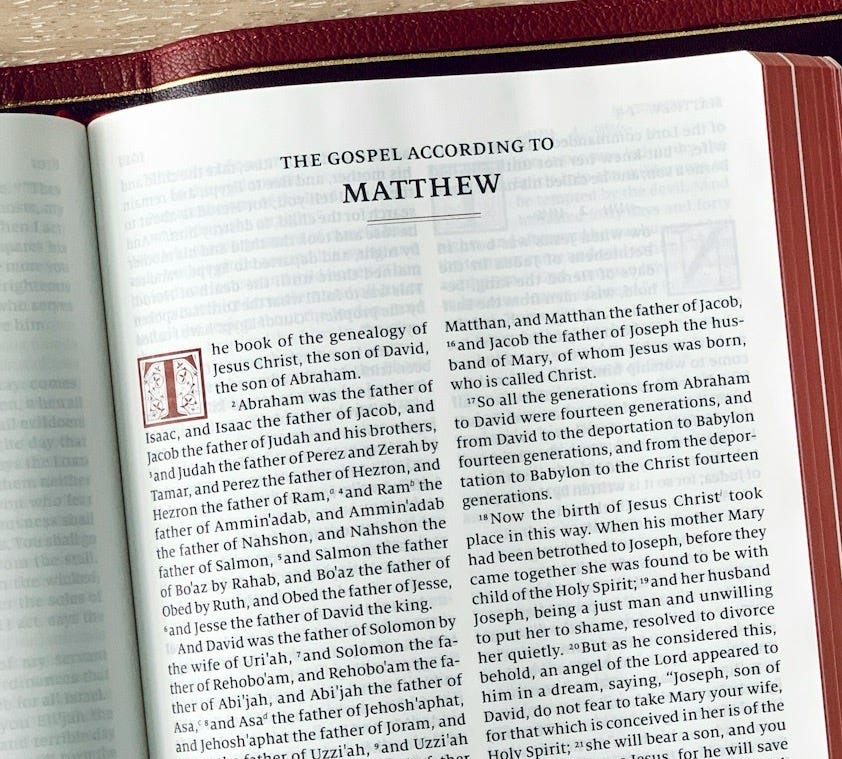Why the Genealogy of Jesus Christ Is So Important
How a List of Names Tells the Greatest Story Ever
Anyone who has already read the Bible, or rather the New Testament, will probably have started with Matthew. The first thing that awaits us there is reminiscent of the Old Testament. An eternally long list that shows the family tree of Jesus. Quite boring at first glance. What exactly is it all about? Why didn't Matthew just leave it out? Instead, the New Testament begins with the genealogy of Jesus. In this article, we will discuss why the family tree is so important and what it tells us about Jesus.

Matthew 1:1–17 (ESV)
1 The book of the genealogy of Jesus Christ, the son of David, the son of Abraham. 2 Abraham was the father of Isaac, and Isaac the father of Jacob, and Jacob the father of Judah and his brothers, 3 and Judah the father of Perez and Zerah by Tamar, and Perez the father of Hezron, and Hezron the father of Ram, 4 and Ram the father of Amminadab, and Amminadab the father of Nahshon, and Nahshon the father of Salmon, 5 and Salmon the father of Boaz by Rahab, and Boaz the father of Obed by Ruth, and Obed the father of Jesse, 6 and Jesse the father of David the king. And David was the father of Solomon by the wife of Uriah, 7 and Solomon the father of Rehoboam, and Rehoboam the father of Abijah, and Abijah the father of Asaph, 8 and Asaph the father of Jehoshaphat, and Jehoshaphat the father of Joram, and Joram the father of Uzziah, 9 and Uzziah the father of Jotham, and Jotham the father of Ahaz, and Ahaz the father of Hezekiah, 10 and Hezekiah the father of Manasseh, and Manasseh the father of Amos, and Amos the father of Josiah, 11 and Josiah the father of Jechoniah and his brothers, at the time of the deportation to Babylon. 12 And after the deportation to Babylon: Jechoniah was the father of Shealtiel, and Shealtiel the father of Zerubbabel, 13 and Zerubbabel the father of Abiud, and Abiud the father of Eliakim, and Eliakim the father of Azor, 14 and Azor the father of Zadok, and Zadok the father of Achim, and Achim the father of Eliud, 15 and Eliud the father of Eleazar, and Eleazar the father of Matthan, and Matthan the father of Jacob, 16 and Jacob the father of Joseph the husband of Mary, of whom Jesus was born, who is called Christ. 17 So all the generations from Abraham to David were fourteen generations, and from David to the deportation to Babylon fourteen generations, and from the deportation to Babylon to the Christ fourteen generations.
This list is much more than a list of names. To anticipate it: It is the prelude to a story that connects heaven with earth. Jesus does not simply appear out of nowhere, but is born into God-directed history. In every single line of this family tree, we can see the story of grace, the fall, and restoration. The family tree is, I would also like to anticipate this, a proof of God's faithfulness. Anyone who overreads it (I have read it quite often or not thought about it) misses the depth of the Holy Scriptures.
Jesus’ Messianic Identity
Let's start with verse 1: Abraham receives from God in the Old Testament the promise from God to have offspring, and all the families of the earth are to be blessed through Him.1 Jesus as the "son of Abraham" is thus pictured as the promised offspring through whom this blessing will be fulfilled. The future reach that Jesus soon got is announced here. However, Abraham is not only the father of the Jewish people, but also the father of all believers.2 David, who was the second king of Israel after Saul, received the promise from God that his descendant would sit on his throne forever.3 In Jewish tradition, this promise was taken very seriously and was an integral part of the hope for the coming Messiah.




